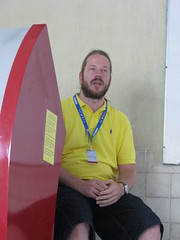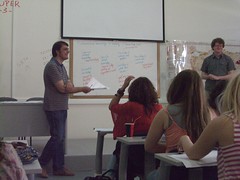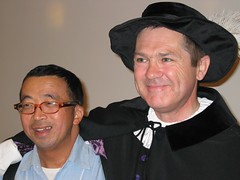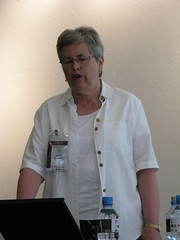The programme (available at the ESU6 website) has lots of interesting stuff, often with six events in parallell, so already it is time to lament all the good talks I will miss. However, such is life at big conferences. Here, I'll instead write about what I won't miss:

Uffe
The conference opens on Monday 19th of July. Uffe Jankvist will give the first plenary lecture, which seems to be based on his newly finished PhD (on historical modules in code theory). I will of course be attending this lecture. Afterwards, I will probably choose Masami Isoda's workshop on "Using historial instruments and interactive e-Textbook for experiencing the interpretation of historical textbooks" (although there are particularly many interesting workshops simultaneously). After lunsh, it seems reasonable to attend Uffe's three-hour workshop on "Students' meta-issue discussions of history of mathematics". As if that wasn't enough, there is an evening session of oral presentations, where Gerlinde Faustmann will talk about "Classroom experiences with history of mathematics", yours truly will talk about "History of mathematics in Norwegian - a literature review" (although the title in the program is "Making history of mathematics available to teachers - one page at a time"). And then Po-Hung Liu will speak about "Evolution of College Students' Eopistemological Views of Mathematics (...)". Then, finally, it's eight o'clock, and it's time to find a wiener schnitzel or something...

Kostas and me in Greece last year

Man Keung Siu (with Peter Ransom)
Tuesday will begin with a plenary lecture by Michael N. Fried ("History of Mathematics in Mathematics Education: Problems and Prospects"). Right thereafter, Costas Nikolantonakis and yours truly will have a two-hour workshop on "Historical methods of multiplication". After lunch I will be relieved to be finished with the main part of my obligations at this conference. I will go to Man Keung Siu's three-hour workshop on "Inscribed square in a right triangle". Then, I'll have no choice, as I am the assigned chair of one of the sessions: I will chair three talks on "The use of periodic property through history (...)" (Gabriela Buendía Abalos), a study of a paper by George Boole (Adriana Cesar de Mattos) and "The geometric representation of complex numbers and education" (Gerard E. Grimberg). And as if that was not enough food for thought for one day, I will take part in the meeting of the HPM Advisory Board from 8 o'clock - hopefully accompanied with dinner.
Wednesday will feel like a day off after these 11 hour days. There will be a plenary lecture by Marc Moyon on "Practical Geometries in Islamic Countries" and a panel discussion on "The history of mathematics in school textbooks". The rest of the day is put aside for lunsh and excursions - as well as a cocktail reception in the evening.

Kristín Bjarnadóttir
Then there's Thursday. Michael Glaubitz will give a plenary lecture on "The Use of Original Sources in the classroom - Empirical Research Findings". Michael was one of the editor of the proceedings from the Oberwolfach meeting on original sources some years ago, and it will be interesting to hear him again. The next plenary lecture, by Raffaele Pisano, will contain epistemological reflections on "the cultural and interdisciplinary role played by physical and mathematical sciences", according to the program. My mind will probably be with the next thing on the agenda: the panel discussion on "The role of the history and epistemology of mathematics in pre-service teachers training". I will be one of the participants of the panel, and this will also be my debut in the plenary of such a conference. After that - and lunch - I will attend Kristín Bjarnadóttir's three-hour workshop on "Arithmetic textbooks in 18th century Icelandic manuscripts". I last heard her at the HPM in Mexico City two years ago, and she is always interesting. And finally, I believe I'll listen to José Manuel Matos and Mária Almeida on "Shaping a modern mathematics pedagogical content knowledge: the case of Telescola in Portugal in the middle 1960s" as well as Catarina Mota's "The concept of tangent line: historical and didactical points in its teaching in Portugal".
Which leaves Friday. I may want to skip the plenary lecture on ICMI's first century, as I've heard Fulvia lecture on the topic before. Then I will probably choose Michael Glaubitz's workshop on "Teaching methods for the use of original sources in the classroom". Then I will consider if I want to hang around for the closing ceremony or if I should run to the train that will take me to holiday in Salzburg...
During the conference, I will also try to take lots and lots of photos - they tend to become useful in the context of the HPM Newsletter...
So that's my plans for next week. It will be fun. And interesting. And I will need the holiday afterwards...
(Update: Just for fun, a few days ago I had a look at what countries are participating in this conference. Here's the list:
Algeria (1)
Austria (9)
Belgium (3)
Brazil (9)
Canada (2)
China (1)
Cyprus (1)
Czech Republic (3)
Denmark (3)
France (18)
Germany (13)
Greece (14)
Hungary (1)
Iceland (1)
Iran (1)
Ireland (3)
Israel (5)
Italy (10)
Japan (2)
Morocco (1)
Mexico (2)
Netherlands (5)
Norway (2)
Poland (1)
Portugal (13)
Slovakia (4)
South Korea (2)
Spain (8)
Taiwan (1)
Uganda (1)
United Kingdom (2)
USA (3)
And then there are a few people who are on the programme but not on the list yet - such as the first plenary speaker...)




No comments:
Post a Comment